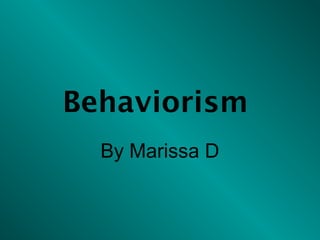
Behaviorism
- 1. Behaviorism By Marissa D
- 2. What is Behaviorism? • The prediction and control of human behavior in which introspection and or independent thinking play no essential part of it’s teaching methods. • Behaviorist recognizes no divide between human and animal because both learn to behave solely through positive and negative rewards.
- 3. Ivan Pavlov • Used conditioning to teach dogs to salivate when he rang a bell. • When he provided a stimulus (food) and the dogs provided the reflex (salivation), he would ring a bell. The dogs then associated the bell with food even if the food was not present. • This is called classic conditioning.
- 4. B.F Skinner • Operant conditioning- learning that is controlled and results in shaping behavior through the reinforcement of stimulus response patterns. • Skinner experimented with pigeons, rewarding them when he got the desired behavior from them.
- 5. Albert Bandura • He believes that people acquire behaviors ,first, through the observation of others and ,then, by using those observations to imitate what they have observed. • Social learning aka Social Cognitive Theory • Observational modeling- watching something and then mimicking the observed behavior.
- 6. In The Classroom • Many classroom management techniques are based on operant conditioning. • Many computer-based instruction and educational software are based on operant conditioning - They provide positive and negative reinforcement.
- 7. Behaviorism in My Class • I think in my classroom, students will be rewarded for their good behavior, such as following instructions and getting good grades. • Students will also be aware of negative reinforcements for bad behavior or grades.
- 8. Sources • Information: Integrating Technology and Digital Media in the Classroom by Shelly, Gunter, Gunter Sixth Edition • Photos: http://ssqq.com/information/tfwcomputers01.htm http://www.uky.edu/~eushe2/Bandura/bandurabio.html http://www.skeptically.org/skinner/ http://developers.sugarcrm.com/wordpress/2010/05/14/thats-some- tasty-dog-food/ http://en.wikipedia.org/wiki/Ivan_Pavlov